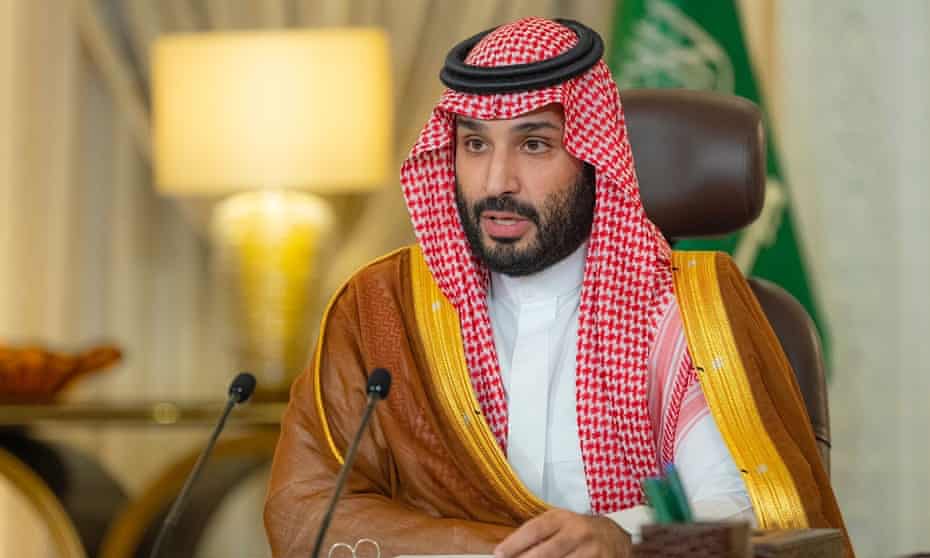Alwaght- As the Ukraine war and global energy crisis give Saudi Crown Prince Mohammed bin Salman a chance to exploit the Western need for oil output increase to break out of multi-year isolation and persuade the Western leaders to return their backing to his political ambitions, these days his hurried actions in normalization of relations with the Israeli regime are making headlines as another section of completing the preparations for ascending the throne.
While one of the key issues of the upcoming Biden visit to Saudi Arabia and meeting bin Salman is expected to be advancing the normalization in the (Persian) Gulf Cooperation Council and even Washington has re-supported the two-state solution and Israeli settlement projects halt in a bid to save the Saudi face in the Arab world, media reports talk about acceleration of Saudi-Israeli thaw process. In this connection, Saudi Reformists account in a Twitter post, quoting Abdullah al-Ouda the son of the Saudi political prisoner Salman al-Ouda, said: "The normalization of relations with the occupying regime is a price paid by Saudi Crown Prince Mohammed bin Salman to meet with US President Joe Biden and improve relations with the country."
Additionally, the prominent Saudi whistle-blower Mujahed in a Twitter message on Tuesday said that a "large office meant to promote normalization" with the Israeli regime is run by the royal advisor Saud al-Qahtani with an order from bin Salman.
Mujahed account added that the office employs 12 people of various Arab nationalities, with an annual budget of $4 million.
The selection of al-Qahtani as a confidante of bin Salman in his normalization case indicates the crown prince's serious plans to normalize. Al-Qahtani, who was involved in the assassination of critical Saudi journalist Jamal Khashoggi, is touted as the second most powerful Saudi man after Prince Mohammed and holds influence in almost half of the government's structure and interferes in public prosecution.
Meanwhile, the Wall Street Journalist reported an increase in the level of secret Israeli-Saudi negotiations, adding that with Biden administration's mediation Saudi Arabia and Israel are working to reach an agreement that could give overwhelming privileges to Israeli commercial flights over Saudi Arabia and pave the way for full Saudi control of the strategic Red Sea islands of Tiran and Sanafir. Earlier, Riyadh allowed a group of Israeli businessmen to travel to Saudi Arabia.
Bin Salman's real goals
The normalization is driven by three major goals.
Certainly, bin Salman's personal ambitions and the need for assurance of smooth ascension to the throne amid serious rivals in the ruling house are among what he wants from the normalization process. This makes sense with a knowledge of the massive Zionism dominance and influence of the economy and media in the Western world, especially in the US and its politics.
Another motivation for the thaw with Tel Aviv is the Saudi siding with the regional American strategy to build an Arab-Israeli alliance to cut its security responsibilities in the Persian Gulf and also a Riyadh will to create a regional balance with its main rivals, the Iran-led Axis of Resistance and Turkey-led Muslim Brotherhood, through partnership with Israel.
The sudden withdrawal of the US from Afghanistan and Iran power gain in the region, especially the Persian Gulf, along with the failure of Riyadh in advancing its goals in the Yemeni war, and the change in the security environment of the Arabian Peninsula with the rise of Yemeni Ansarullah Movement and its domination of the Bab-el-Mandeb Strait are issues that gave Riyadh reasons to see a regional balance in association with Tel Aviv.
The third driver is the economic, technological, and educational benefits he thinks he can make from normalized ties with the Israelis, especially that he is not afraid to invite the Israeli companies and investors to join his ambitious development projects like Neom megaproject as part of the Vision 2030 to transform into the region's top economy and cut reliance to oil incomes.
How realizable are bin Salman plans?
The same reasons that motivate bin Salman to move to a normalization deal were the same ones drove the normalizers in the UAE, Bahrain, Sudan, and Morocco to the so-called peace deal with Israel. Now that the normalization did not change the early normalizers' regional position and brought them no economic growth, military power, and security shield, the question is why should we think Saudi Arabia is a difference?
There is no doubt that pessimism about building security through normalization is not realistic in terms of countering the regional threats and challenges or paving the way for assuming the throne. Security cooperation with Tel Aviv is never new and while over the past years their work reached its peak in Yemen war, the outcome of the most important Saudi foreign policy case is a full-scale scandalous defeat. Another example of defeat of Saudi-Israeli alliance against the Axis of Resistance is Syria war. Therefore, the Persian Gulf Arab states themselves are practically the victims of the Israeli presence in the Persian Gulf as Iran's red line and Israeli involvement in Yemen case.
Internally, although the public protests to normalization may not have a chance of ignition because of bin Salman's crackdown, over time grounds of public discontentment would emerge in the lower layers of the traditional, tribal, and conservative society of Saudi Arabia as the cradle of Islam. Historical experience shows that Saudi partnership with the US in the first and second Persian Gulf wars were the main driving force behind rise of the internal Saudi opposition. Indeed, normalization would be way costlier to Riyadh than alliance with Washington in the Persian Gulf wars.



























